- Braun & Brains
- Posts
- Brains: Andy Dunn’s Pivot From Bonobos Fashion to Friendship
Brains: Andy Dunn’s Pivot From Bonobos Fashion to Friendship
I focused on my health, but it lowered my life expectancy: why social isolation is detrimental to our well-being.
Braun & Brains is my personal outlet where I cover tech, business, and adjacent topics. Need production, insights, or a fresh perspective for your podcast or social media? Let’s talk.
I focused on my health so much it lowered my life expectancy: how social isolation is crucial to our wellbeing and what you can do to foster it.
If you want to live longer, get over yourself and join that adult kickball league.
The first year I spent in New York was all about working late and staying out even later. If you knew me back then, you would have met me either at a WeWork or somewhere downtown after 10 p.m. I had an active social life with an inconsistent cast of rotating city newbies like myself, but that schedule quickly burned me out when I realized that sleep isn’t something you can simply catch up on over the weekend. After that year, I gradually started cutting back on after-work activities completely, unknowingly closing myself off to a world that consisted mostly of my cat and me.
I didn’t really mind at first, nor did I notice the dramatic change I was making. In fact, it was actually encouraged. I saw more people online talk about leaning into being homebodies and talking up the solo-mindset that I was digging myself into. My boring, isolating life was being praised. Many of us have been conditioned to chase images of lifestyles that isolate us: private gyms, doorstep grocery deliveries, and the freedom to work from home, all while overlooking the true riches of human connection. Eventually, I realized that I wasn’t fulfilled by a routine that involved closing my laptop after work, going for a run, making dinner, watching a show, and then going to bed. Doing that every night just wasn’t enough for me; I found that I no longer looked forward to anything after work.
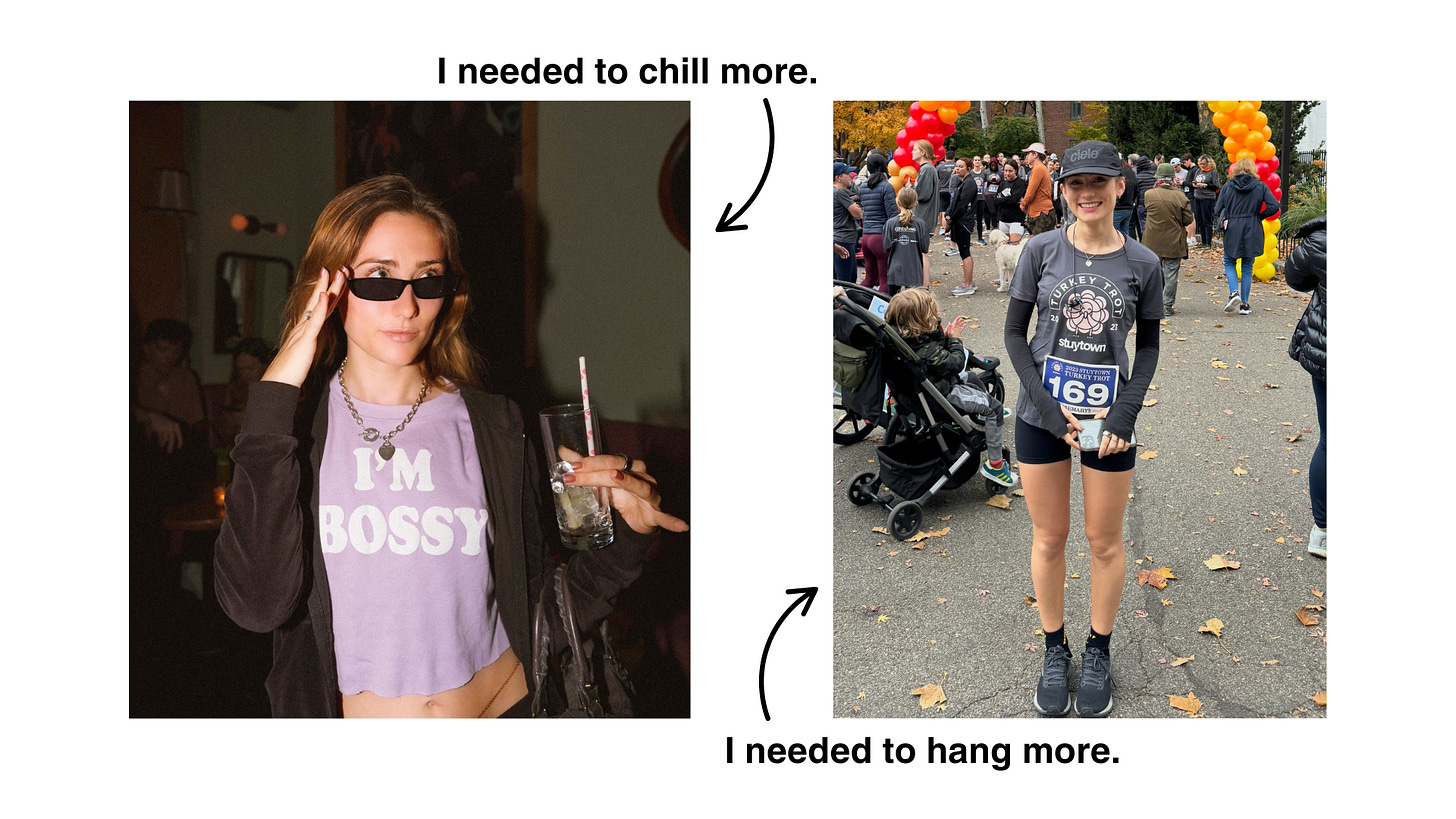
Partying every night wasn’t a great idea… isolating myself wasn’t either.
Last year, I made an effort to reconnect with friends by inviting them for drinks or a walk after work. I knew that a one off hangout wasn’t going to make a best friend and tried to be consistent with inviting people out and saying yes to things. It was a good start, and as someone who has friends from all walks of life, it was fun to see what everyone was up to. However, it was hard to be the one reaching out each week and juggling everyone’s social calendars along with my own.
This year, I’m trying to become more involved in my community and create more friend groups, including something I once swore I would never do: join an adult kickball league. I love intramural sports, don’t get me wrong; it was just that kickball always struck me as a little goofy. Yet here I am, in my late twenties, creating a group chat full of young adults who meet after work to play the most non-athletic outdoor game Volo Sports has to offer. I don’t think adult kickball will be some kind of savior for me, but I hope it makes an impact.
Today, I’d happily sacrifice a little sleep, whether that means staying out late to grab pizza with my kickball team after we win the championship (manifesting, lol) or waking up early for a sunrise walk while chatting with local coffee shop regulars. Yet society (or maybe it’s just social media) tells me that if my sleep hygiene goes to waste, I might as well be drunk chain-smoking outside a dive bar... but that couldn’t be more far off. The narrow definition of health as we know it has ruined our social lives.
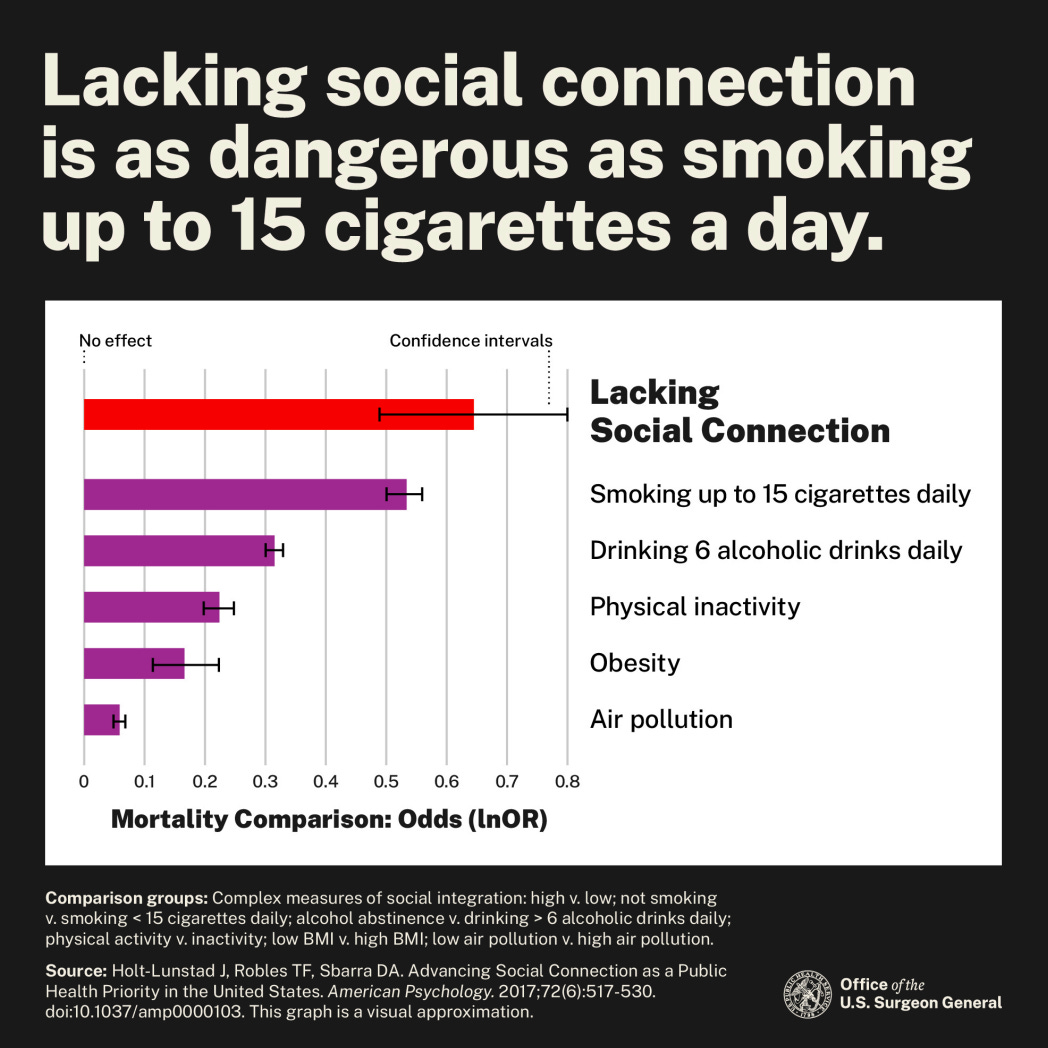
Research shows that real-life socializing can reduce stress, lower blood pressure, and even boost our immune systems. People who are isolated literally die earlier. The Surgeon General has stated that “loneliness and social isolation increase the risk for premature death by 26% and 29%,” yet we still focus on securing those eight hours of sleep, missing out on dinner parties by working late, and avoiding small talk with our neighbors in order to protect our boundaries from being compromised.
As the Surgeon General warns, “Loneliness and social isolation have reached epidemic proportions,” transforming our focus on individual achievement into a public health challenge.
Sharing an Instagram Reel with your friend or Snapchatting a group daily does not replicate hanging out. Technology has played a part in separating us physically more than ever before, giving us the false sense that interaction can be substituted over the internet. It can’t. Technology is a tool—something to use when we’re away from each other, a supplement to our real-life experiences, or an outlet to meet others in similar situations. But it is by no means going to solve social isolation. If anything, it has perpetuated it.
Can it also help us get out of this mess?
Over the next few weeks, I will be sitting down with people who are battling this modern problem. If you or someone you know is trying to make the world a less lonely place (preferably with the help of technology) send me an email.
First up is Andy Dunn. You might remember him as the co-founder of Bonobos and the author of Burn Rate, a candid account of his entrepreneurial journey with bipolar disorder. Now, Andy is putting his skills together, speaking out about mental health and building as an entrepreneur, with his new company, Pie. Pie is a platform focused on bringing people together in real life.
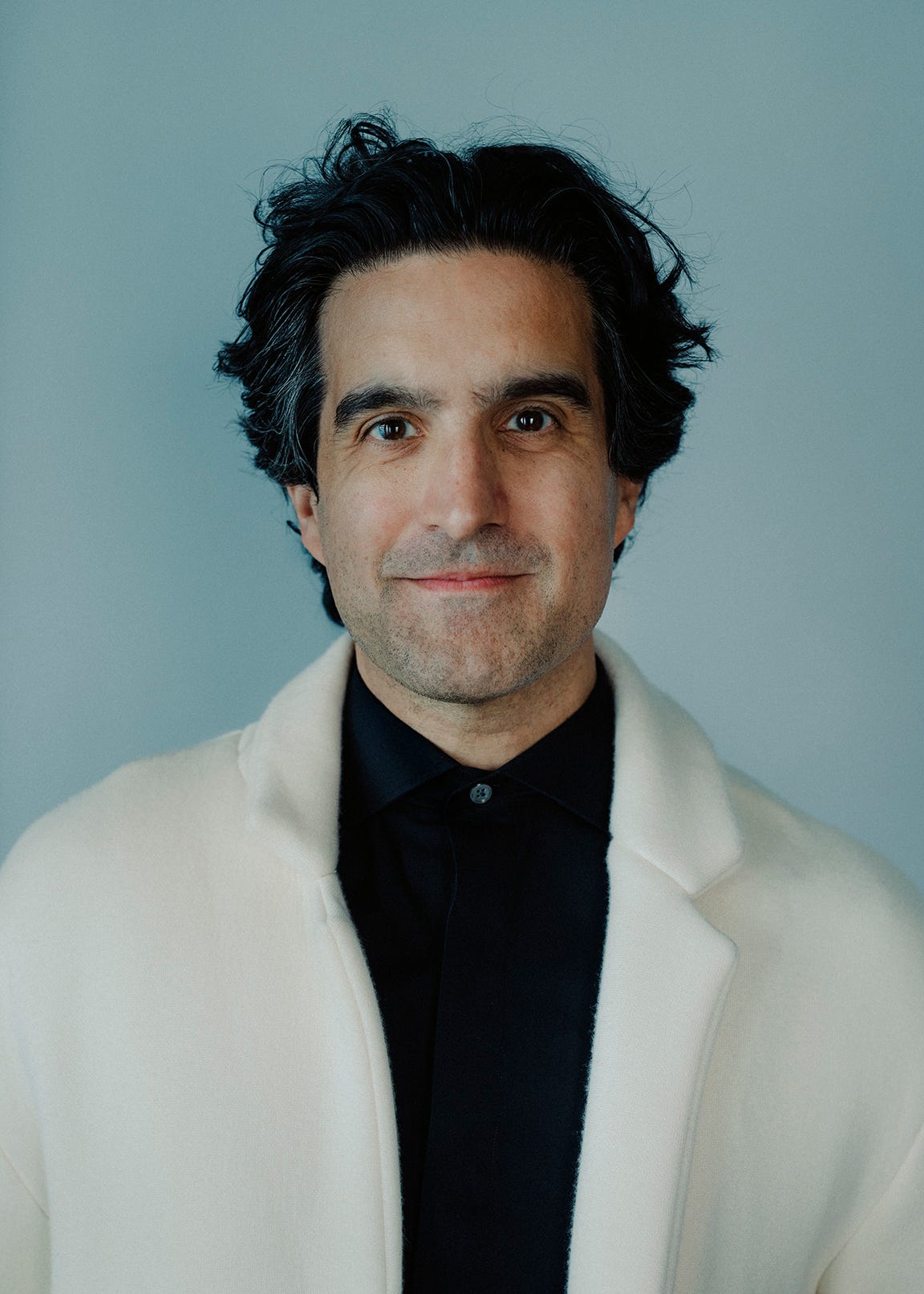
Andy Dunn is the founder of Pie, a platform helping users make better friends by facilitating recurring in-person interactions and discovering local events.
Previously, Andy was the co-founder of the menswear brand Bonobos in 2007 and served as its CEO until Walmart acquired it in 2017. His book Burn Rate covered his entrepreneurial journey as a founder with bipolar disorder.
Q: Hey Andy, can you introduce yourself and share a bit about your background?
Andy Dunn:
"Yeah. What's up? I'm Andy Dunn, founder of Pie. Got to do some cool stuff in the past. I sold pants on the internet for a long time. My last company was called Bonobos. Coming outta that, I wrote a memoir on my journey at the intersection of mental health and entrepreneurship. That's called Burn Rate: Launching a Startup and Losing My Mind."
Q: So why the pivot from fashion to friendship? It seems like quite the jump from selling pants to building an app for making friends.
Andy Dunn:
"From fashion to friendship. That sounds like my next book. I hadn't thought of it that way. You see, coming out of Bonobos, one thing I really loved was building a movement and shifting the zeitgeist. And I think 2007, may sound weird now, but back then it wasn’t cool for men to care about how their clothes fit. That was a contrarian idea, and there was no ecosystem of building brands digitally. It felt exciting.
Then retail got crazy complex. You have inventory, big teams, operations, leases. Bonobos eventually opened 60 stores—even though we said we'd never sell in stores—and I even worked for three years at Walmart after Bonobos was acquired. I mean, imagine this: from selling pants in my bedroom on 17th Street in New York to working for a company with 2.4 million people. That retail journey was amazing. But I realized I didn’t want to do that anymore—I wanted something bigger."
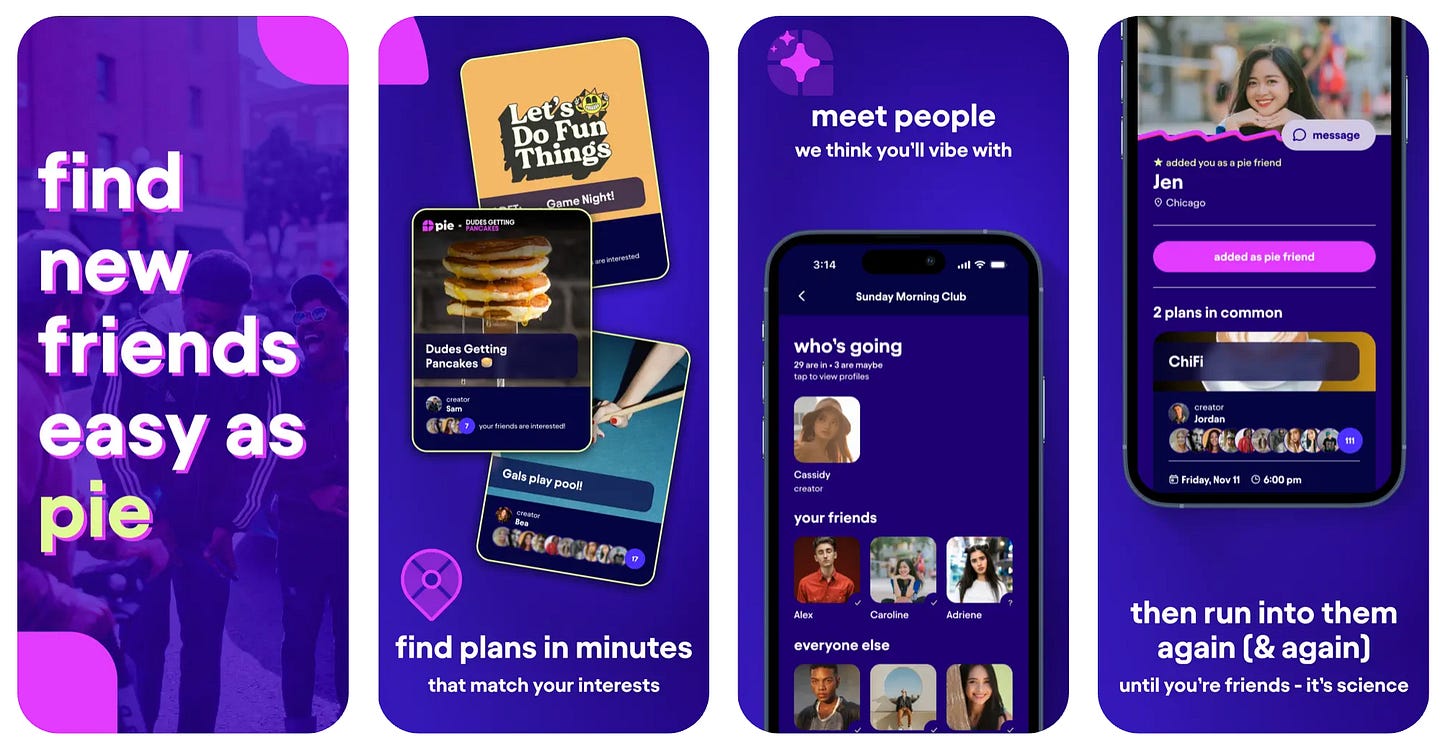
Q: What made you shift your focus to mental health and social connections?
Andy Dunn:
"After 15 years in New York, where I built Bonobos and had my whole social world, I moved back to Chicago. I thought my parents were here, my sister's here, a couple of college friends who are still here. But then, for the first time, I realized I didn't have any friends. I had my wife, my son, my family—but no platonic friends, no tribe or community that I belonged to.
That realization, combined with my own struggles—wrestling with Bipolar I and going through a second mental health problem—pushed me into focusing on improving mental health outcomes globally. I wanted to tackle social isolation in a very tangible way."
Q: You make a clear distinction between loneliness and social isolation. Could you explain how you see the difference?
Andy Dunn:
"Yeah. I like to parse loneliness and social isolation apart. Loneliness is a state of being—and it’s also a state of mind. You can be in a relationship, have friends around, and still feel lonely. It’s similar to sadness. I didn’t know what sadness was until I watched Inside Out and realized that sadness invites empathy, creates art, and, well, has its own value.
But social isolation is different. It’s about physically not being around people. Think of someone stuck in their apartment doing a podcast with no in-person connection. The Surgeon General pointed out that we’ve lost 24 hours a month of in-person time over the last 20 years. At Pie, our belief is that if we can bring two to three hours of in-person hangouts back into your week, we can reverse the degradation of our social fabric."
Q: There's a lot of talk about algorithms in social apps—many people are skeptical about having one dictate who you should be friends with. How does Pie approach this?
Andy Dunn:
"I think they're right. The idea of a company saying, 'now you should meet this person' isn’t totally natural for platonic groups. Instead of one-to-one matching like Bumble BFF—which doesn't really work for straight men—we use a blend of high-quality group matching and what I call the IRL creator economy.
Basically, we create environments where you bump into people in a group setting repeatedly. The science on platonic friendship says you need to run into someone five times before you move to a deeper connection. We layer that natural approach with AI to spot the highest probability for a fruitful social collision."
Q: Tell me more about the operational and economic model behind Pie. How do community leaders and paid events fit in?
Andy Dunn:
"At Pie, 90% of events are free. Think run clubs, book clubs, arts events, craft gatherings—something that feels like an IRL (in-real-life) community. But sometimes, you do need paid events. For example, one of our community leaders who runs a run club organizes additional meetups, like salsa dancing on a school night, drinks, movies—all that extra stuff happens in a group chat. She charges $25 a month, and with 900 people in her group, that comes to about $180,000 a year.
The idea is that while the majority of our events are free, a premium experience can exist to compensate the effort of building and curating a community. Our revenue currently comes off our group matching product, Spark by Pie. As we build additional community membership tools, we’re essentially creating a freemium model that funds the free experience."
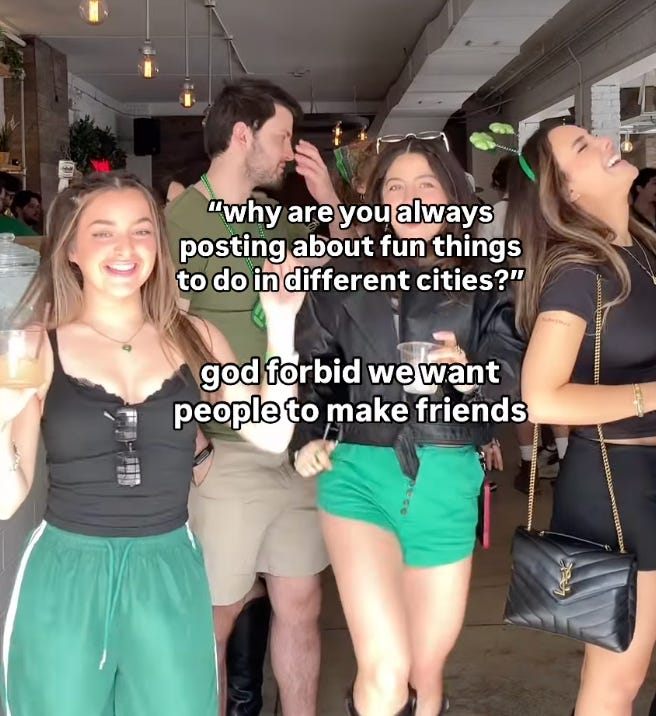
@pie on Instagram
Q: How does Pie compare to legacy social apps like Meetup, Bumble BFF, or even Facebook Events?
Andy Dunn:
"Legacy players like Meetup are seen as low on brand recognition with the new generation. Meetup, for instance, is 26 years old, and it was even sold for peanuts to an Italian company. It may have worked for Gen X and early millennials, but it doesn't really resonate with the social mobile generation.
And then there’s Facebook Events, which were once cool between 2004 and 2010. But now, for the average Gen Z, it's not relevant. Bumble BFF focuses on one-to-one platonic matching, which is inherently challenging—straight men just aren’t in the habit of swiping on other straight men. We believe friendships are naturally formed in group settings where you run into the same people repeatedly. That’s why our approach combines group matching with the IRL creator economy for organic, scalable connections."
Q: What does the future look like for Pie, and how do you plan to scale this model sustainably?
Andy Dunn:
"Looking five years ahead, I see Pie as the go-to app when you move to a new city. In the way Hinge became synonymous with serious relationships, Pie will be the platform for meeting people and building lasting friendships.
Our strategy is twofold. First, we’re building a robust IRL creator economy where community leaders get compensated and can monetize their skills. Second, we’re leveraging sophisticated AI to find the best opportunities for social collisions in group settings. Together, these elements will create a clear network effect that is far more sustainable than many of today's dating apps."
Q: Finally, where should people check out Pie, and what do they need to know about its availability?
Andy Dunn:
"If you're in Chicago, Austin, or the Bay Area, go ahead and download the Pie app and follow us on Instagram at @pie. But if you're not in one of these cities yet, please do not download the app. We're very transparent about only rolling out in cities where there's genuine activity. It’s better to wait than to leave a one-star review because nothing’s happening. We're steadily growing, and our goal is to reach more cities as soon as the network is strong enough."

Reply